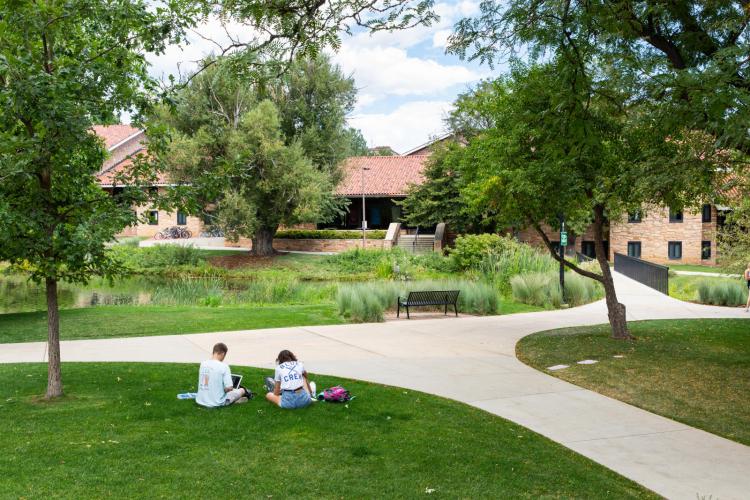Ways for students to manage stress and anxiety

Stress can impact your student’s academic performance, mental health and overall well-being. Here are some tips to help your student manage stress and anxiety in the moment and long-term.
1. HALT
The HALT method reminds us to check if we’re feeling hungry, angry, lonely or tired—common triggers that can amplify stress and anxiety. If your student is feeling overwhelmed, encourage them to check in with themselves by asking:
- Hungry: Are you feeling hungry? If so, take a moment to grab a bite to eat. This can help relieve any “hangry” feelings and give your student an energy boost.
- Angry: Are you angry? Encourage your student to take a moment to think through their emotions. Remind them to give themselves the space and time to calm down and find ways to address it in a healthy way.
- Lonely: Are you lonely? This doesn’t necessarily mean your student is alone, but they may feel distant, isolated, withdrawn or disconnected. This can be a clue that it’s time to for your student to reconnect with people they care about, or people who care about them. Try scheduling a time to catch up with your student, especially during stressful times of the year.
- Tired: Feel fatigued physically or mentally? Encourage your student to take more breaks throughout the day. Whether they meditate, stretch, lie down or close their eyes for a few minutes, short periods of rest in their daily routine can help prevent burnout.
2. Attend workshops
Counseling and Psychiatric Services (CAPS) provides free workshops for all students that can help them develop tools and skills to manage anxiety long-term. Some workshops that can help address stress and anxiety include:
- Anxiety Toolbox: Students learn practical and effective skills for managing stress and anxiety related to school, relationships, life and more.
- Feel Better Fast: Students learn how to regulate emotions, improve their distress tolerance and practice mindfulness.
- Feel Good Friday: Students can join a meditation session at the CU Art Museum to practice mindfulness and take a break from the day.
3. Reframe negative thoughts
The way we talk to ourselves can have a huge impact on how we feel and how we cope with different situations.
Encourage your student to pay attention to when a negative thought pops into their head. It could be about a class, internship or job, themselves or other people. If they’re experiencing negative thoughts, remind them to pause to take a deep breath. Next, encourage them to question those thoughts. It can be helpful to ask questions like “Is this helpful?” Finally, try to help your student reframe these thoughts. It’s not always possible to turn negative thoughts into positive ones, so it may be more helpful to aim for something neutral instead. Here are some examples of how your student can reframe these unhelpful thoughts:
- All or nothing thinking:
- Original thought: “If I don’t get perfect grades, I’m a failure.”
- Reframe: "Success is more than just my grades.”
- Catastrophizing:
- Original thought: “I made a mistake at work and now I’m going to get fired.”
- Reframe: “Mistakes happen. I just need to be honest and see what I can do to make it better.”
- Overgeneralization
- Original thought: “Nobody likes me.”
- Reframe: “I haven’t met people I really click with yet, but I will. I just need to give it more time.”
4. Practice self-care
Creating lasting resilience to stress requires consistent self-care habits. While these practices take time to develop, they provide the foundation for sustainable well-being:
- Physical activity: Regular activity releases endorphins and can help reduce stress. Encourage your student to find and spend time doing activities they enjoy. Remind them that they don’t have to do high intensity or traditional workouts to stay active. A daily walk around campus can help, and the Rec Center can be a great place to explore different forms of activity that they may enjoy.
- Quality sleep: Encourage your student to get seven to nine hours of sleep nightly by maintaining a consistent schedule, creating a relaxing bedtime routine and optimizing their sleep environment (cool, dark and quiet). If they need a nap during the day, you can let them know that there are nap pods on campus.
- Social connection: Encourage your student to maintain social relationships even during busy periods. Encourage them to spend regular time with friends, join campus organizations, form study groups and attend student events to meet new people.
- Professional support: Let your student know it’s okay to seek help when needed. Campus counseling services, healthcare providers and peer support programs are valuable resources that can provide specialized guidance.
Resources
If your student is still struggling to manage feelings of stress or anxiety or is feeling overwhelmed, there are resources on campus that can help.
Counseling and Psychiatric Services (CAPS)
CAPS offers workshops, drop-in hours, screening appointments and referrals to help students address mental health concerns and feel their best.
AcademicLiveCare
All students can access free medical and mental health support, including psychiatry, virtually through AcademicLiveCare. Simply sign up using your IdentiKey.
Peer Wellness Coaching
Students can meet with a trained student to explore how they can improve study skills, enhance time management, meet new people, create routines and more.
Acupuncture (acudetox)
Did you know acupuncture can help relieve stress and improve your overall well-being? Free sessions are available to students through the Collegiate Recovery Community (CRC) and Counseling and Psychiatric Services (CAPS). Check the online schedules to learn more.


